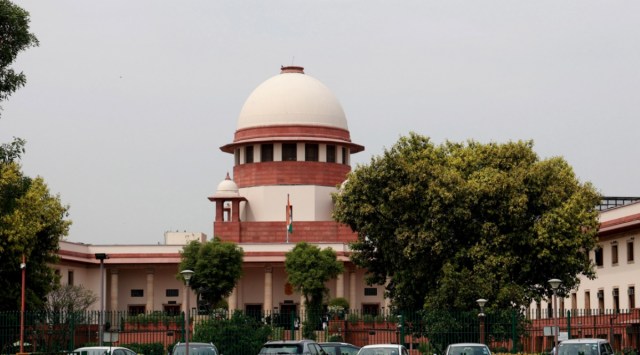On immunity to senior govt officers, Supreme Court says 2014 ruling retrospective
In a unanimous verdict, a five-judge constitution bench headed by Justice Sanjay Kishan Kaul ruled that the apex court's May 6, 2014 verdict, which had struck down section 6-A (1) of the DSPE Act, 1946, providing immunity to such officers in graft cases, will have retrospective effect.
 The bench noted Parliament amended the law and inserted section 17A in the Prevention of Corruption Act, 1988 with effect from July 26, 2018 providing for the statutory need for sanction to prosecute but without any classification of government servants. (Express File Photo)
The bench noted Parliament amended the law and inserted section 17A in the Prevention of Corruption Act, 1988 with effect from July 26, 2018 providing for the statutory need for sanction to prosecute but without any classification of government servants. (Express File Photo) THE ALREADY struck down provision in the Delhi Special Police Establishment (DSPE) Act, 1946, which made central government sanction mandatory for the CBI to prosecute officers of the rank of Joint Secretary and above, will stand nullified from September 11, 2003, when it was inserted in the Act, the Supreme Court ruled Monday.
A five-judge Constitution bench presided by Justice S K Kaul said that its 2014 judgment in the Subramanian Swamy vs Union of India case, in which Section 6A(1) of the DSPE Act was held as invalid, will have retrospective effect.
The question before the bench, also comprising Justices Sanjiv Khanna, A S Oka, Vikram Nath and J K Maheshwari, was “whether declaration of any law as unconstitutional by a constitutional court would have retrospective effect or would apply prospectively”.
The bench, which went into various rulings on the matter, concluded that “from the… discussion, it is crystal clear that once a law is declared to be unconstitutional, being violative of Part-III of the Constitution, then it would be held to be void ab initio, stillborn, unenforceable and non est in view of Article 13(2) of the Constitution and its interpretation by authoritative pronouncements”.
“Thus, the declaration made by the Constitution Bench in the case of Subramanian Swamy… will have retrospective operation. Section 6A of the DSPE Act is held to be not in force from the date of its insertion i.e. 11.09.2003,” it said.
Article 13(2) states that “the State shall not make any law which takes away or abridges the rights conferred by this part and any law made in contravention of this clause shall, to the extent of the contravention, be void.”
In its 2014 judgment, the court had said: “Section 6A(1), which requires approval of the central government to conduct any inquiry or investigation into any offence alleged to have been committed under the Prevention of Corruption Act, 1988 where such allegation relates to (a) the employees of the central government of the level of Joint Secretary and above and (b) such officers as are appointed by the central government in corporations established by or under any central Act, government companies, societies and local authorities owned or controlled by the government, is invalid and violative of Article 14 of the Constitution.”
On Monday, the bench said that “Section 6A of the DSPE Act is a part of the procedure only in the form of a protection to senior government servants. It does not introduce any new offence nor it enhances the punishment or sentence” and as such will not attract Article 20(1) of the Constitution.
Article 20 (1) states that no person shall be convicted of any offence except for violation of a law in force at the time of the commission of the Act charged as an offence, nor be subjected to a penalty greater than that which might have been inflicted under the law in force at the time of the commission of the offence.
The question arose when the court was hearing an appeal filed by the CBI challenging a Delhi High Court order in the case of a Chief District Medical Officer arrested while allegedly accepting a bribe.
The matter, which came up before a two-judge bench, was then referred to the five-judge Constitution bench that pronounced its verdict on Monday.
Delving into the history of the safeguards to government servants from prosecution, the five-judge bench said that “in 1969, the central government issued the Single Directive, which is a consolidated set of instructions issued to the CBI by various ministries/departments and has been amended from time to time”.
“Directive No.4.7(3) contained instructions regarding modalities of initiating an enquiry or registering a case against certain categories of civil servants and provided for a prior sanction of the designated authority to initiate investigation against officers of the government and public sector undertakings and nationalized banks above a certain level,” it said.
This was held as invalid by the Supreme Court in its December 18, 1997 judgment in Vineet Narain case.
The requirement of sanction similar to Single Directive No.4.7(3) was introduced by way of an ordinance with effect from August 25, 1998 and it lasted till October 27, 1998 when it lapsed. Thereafter, in 2003, Section 6A, akin to the Single Directive, was inserted in the DSPE Act, but was held invalid in the 2014 judgment.
However, Parliament again inserted Section 17A in the Prevention of Corruption Act, 1988 with effect from July 26, 2018 and it has continued to remain in the statute book, the bench noted, adding that it also provided for sanction before prosecution but without any classification of government servants. “All government servants of whatever category, class, or level, are provided protection under Section 17A of the PC Act, 1988,” it said.
“From the above, we notice that there are small windows of couple of years on two occasions when there was no such protection available, otherwise, right from 1969, the protection regarding sanction before prosecution has remained in force and continues as such even now,” the ruling said.
CBI sources said “one would have to read the fine print of the order to understand its large implications”. “But as of now we are taking it as the resolution of a pending matter before the court regarding one of our cases” in which prior sanction had not been taken, said a source.
A former senior CBI officer, however, said that on the face of it the judgment had the potential of opening cases where sanction to start an investigation was denied by the government between 2003 and 2014.
Another officer said that it was unlikely to open some kind of Pandora’s box.







